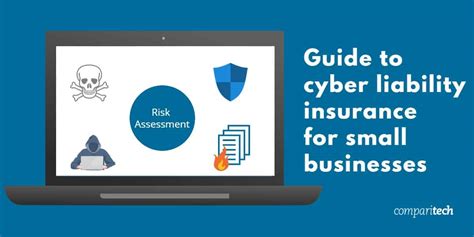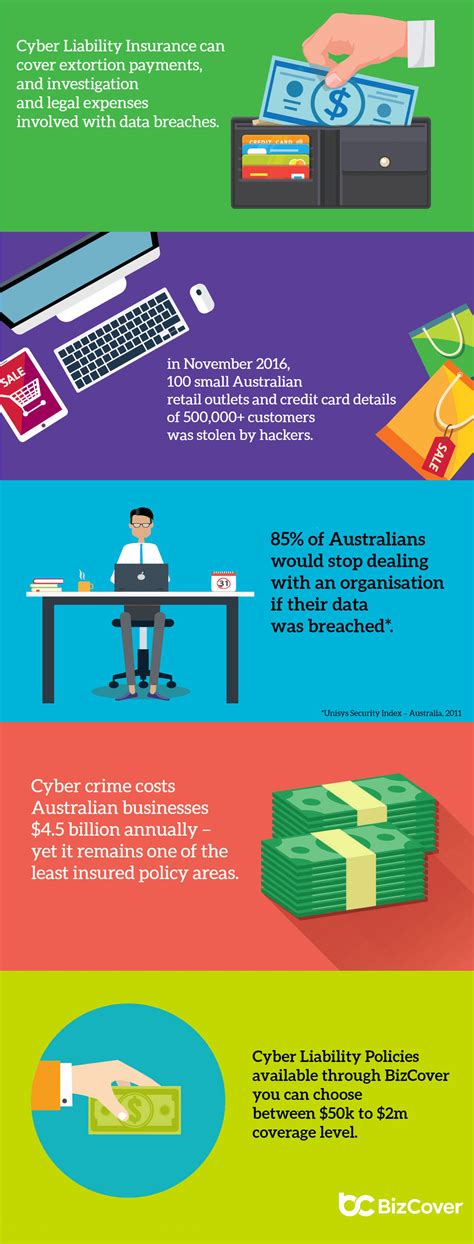Cyber Insurance For Small Business

In today's interconnected world, small businesses are increasingly vulnerable to cyber threats. From data breaches and ransomware attacks to phishing scams and system disruptions, the digital landscape presents a myriad of risks. Recognizing this, many forward-thinking small business owners are turning to cyber insurance as a proactive measure to safeguard their operations and mitigate potential financial losses.
Cyber insurance is a specialized form of coverage designed to protect businesses from the unique challenges posed by the digital realm. As small businesses often lack the extensive resources and dedicated cybersecurity teams of larger enterprises, they can be particularly susceptible to the devastating impacts of cyber attacks. With cyber incidents on the rise and the potential for severe financial repercussions, it is imperative for small business owners to understand the value of cyber insurance and how it can provide crucial support in navigating the ever-evolving riskscape.
Understanding the Cyber Threat Landscape

The Rising Tide of Cyber Attacks
The past decade has witnessed a significant surge in cyber attacks targeting small businesses. According to a recent study, over 43% of cyber attacks now target small businesses, a stark contrast to the 18% prevalence just a few years ago. This shift underscores the growing appeal of small businesses as targets for cybercriminals, who recognize their often limited cybersecurity defenses and the potential for substantial financial gains.
Ransomware attacks, in particular, have emerged as a prevalent and lucrative threat. These attacks involve the encryption of critical business data, rendering it inaccessible until a ransom is paid to the attackers. The Ransomware Task Force reports that ransomware incidents have increased by over 150% in the last year, with small businesses often bearing the brunt of these attacks. The financial and operational disruptions caused by ransomware can be catastrophic, underscoring the critical need for robust cybersecurity measures and comprehensive insurance coverage.
Data Breaches and Privacy Concerns
The protection of customer and client data is a paramount concern for small businesses. With increasing regulatory scrutiny and stringent data privacy laws, such as the General Data Protection Regulation (GDPR) and the California Consumer Privacy Act (CCPA), businesses face substantial legal and financial penalties for data breaches and privacy violations.
A single data breach can result in substantial costs associated with breach notification, legal fees, and potential damages to affected individuals. Furthermore, the erosion of customer trust and the loss of business reputation can have long-lasting impacts. Cyber insurance policies that offer coverage for data breach response and privacy liability are therefore essential components of a comprehensive risk management strategy for small businesses.
Benefits of Cyber Insurance for Small Businesses

Financial Protection and Peace of Mind
One of the primary advantages of cyber insurance is the financial protection it provides. Cyber attacks can result in a range of costs, including system restoration, data recovery, legal fees, regulatory fines, and business interruption losses. With cyber insurance, small businesses gain access to the financial resources needed to navigate these challenges and minimize the long-term impact on their operations.
In addition to direct financial support, cyber insurance policies often include access to expert resources and specialized services. This may include cybersecurity consultants, forensic investigators, and legal advisors who can guide businesses through the aftermath of an attack, ensuring a swift and effective response. This level of support can be invaluable for small businesses, providing the expertise and resources often lacking in-house.
Breach Response and Crisis Management
A data breach or cyber attack can quickly escalate into a full-blown crisis if not managed effectively. Cyber insurance policies typically include coverage for breach response and crisis management, providing small businesses with a comprehensive plan to navigate these challenging situations.
This coverage may encompass various aspects, including:
- Breach notification: Assistance with notifying affected individuals and regulatory bodies, in compliance with applicable laws.
- Credit monitoring: Providing credit monitoring services to individuals whose personal information has been compromised.
- Public relations support: Helping businesses craft and execute effective communication strategies to maintain customer trust and mitigate reputational damage.
- Forensic investigations: Engaging experts to investigate the breach, identify the root cause, and implement measures to prevent future incidents.
Risk Assessment and Prevention
Cyber insurance providers often offer risk assessment and prevention services as part of their policies. These services can help small businesses identify vulnerabilities in their systems and processes, enabling them to take proactive measures to enhance their cybersecurity posture.
Risk assessments may involve:
- Network security evaluations: Scanning and analyzing network infrastructure to identify weaknesses and potential entry points for attackers.
- Employee training: Providing training programs to educate staff on cybersecurity best practices, helping to reduce the risk of human error and social engineering attacks.
- Incident response planning: Developing customized incident response plans tailored to the business's specific needs and operations.
Choosing the Right Cyber Insurance Policy
Understanding Policy Coverage
When selecting a cyber insurance policy, it is crucial to thoroughly understand the coverage provided. Cyber insurance policies can vary significantly in their scope and limits, so it is essential to carefully review the terms and conditions.
Key coverage areas to consider include:
- First-party coverage: This covers direct losses suffered by the insured business, such as business interruption, data restoration, and crisis management expenses.
- Third-party coverage: This provides liability protection in the event the business is sued by customers, clients, or other third parties for data breaches or privacy violations.
- Media liability: Covers the business against claims arising from content published online, including copyright infringement, defamation, and privacy violations.
- Network security and privacy liability: Provides coverage for privacy breaches and network security incidents, including regulatory fines and penalties.
Customizing Your Policy
Cyber insurance policies can often be customized to meet the unique needs of your business. This may involve adjusting coverage limits, adding endorsements for specific risks, or tailoring the policy to align with your industry-specific requirements.
Consider working with an insurance broker or agent who specializes in cyber insurance. These professionals can provide valuable guidance and help you navigate the complex world of cyber insurance, ensuring you obtain a policy that adequately protects your business.
Real-World Examples and Case Studies
Small Business Cyber Attack Scenarios
To illustrate the importance of cyber insurance, let’s explore a few real-world scenarios involving small businesses that have fallen victim to cyber attacks.
Ransomware Attack on a Retail Business
A small retail business with multiple locations across a state is hit by a ransomware attack. The attack encrypts their point-of-sale systems, rendering them inoperable. The business is unable to process transactions, resulting in significant financial losses and disruption to their operations.
With a comprehensive cyber insurance policy in place, the business is able to access the necessary funds to pay the ransom and cover the costs of system restoration. The policy also provides coverage for business interruption losses, helping the business recover and minimize the long-term impact of the attack.
Data Breach at a Medical Practice
A medical practice specializing in family medicine experiences a data breach, resulting in the exposure of sensitive patient information. The breach is caused by a phishing attack, where an employee unknowingly downloads malware onto the practice’s network.
The cyber insurance policy held by the practice provides coverage for breach response, including forensic investigations, breach notification, and credit monitoring services for affected patients. The policy also covers potential regulatory fines and legal fees, helping the practice navigate the complex aftermath of the breach.
The Future of Cyber Insurance for Small Businesses

Emerging Trends and Technologies
The field of cyber insurance is continually evolving to keep pace with emerging technologies and changing risk landscapes. As small businesses adopt new technologies, such as cloud computing, Internet of Things (IoT) devices, and artificial intelligence (AI), the potential for new cyber risks also increases.
Cyber insurance providers are responding to these trends by developing innovative coverage options and risk management strategies. This includes offering policies that specifically address the unique risks associated with emerging technologies and providing resources to help small businesses navigate these complex environments.
Collaboration and Shared Responsibility
The future of cyber insurance for small businesses may also involve greater collaboration between insurers, cybersecurity experts, and business owners. By working together, these stakeholders can develop more effective risk management strategies and share insights and best practices.
Additionally, there is a growing emphasis on shared responsibility in the realm of cybersecurity. This means that while cyber insurance provides crucial financial protection, it should be viewed as a complementary measure to robust cybersecurity practices and employee training. By combining comprehensive insurance coverage with proactive risk management, small businesses can significantly reduce their exposure to cyber threats and build a more resilient digital posture.
Conclusion
In today's digital world, small businesses face an ever-growing array of cyber threats. From ransomware attacks and data breaches to privacy violations and system disruptions, the potential for significant financial and operational impacts is real. Cyber insurance serves as a critical tool in the risk management toolkit, providing financial protection, expert support, and peace of mind.
By understanding the unique risks posed by the digital landscape and the benefits of cyber insurance, small business owners can make informed decisions to safeguard their operations. With the right coverage in place, businesses can navigate the challenges of the digital age with confidence, knowing they have the resources and support needed to recover from cyber incidents and emerge stronger than ever.
FAQ
What is the average cost of a cyber insurance policy for small businesses?
+The cost of cyber insurance policies can vary significantly based on a range of factors, including the size and industry of the business, the level of coverage desired, and the business’s existing cybersecurity measures. On average, small businesses can expect to pay between 500 and 3,000 per year for cyber insurance, although premiums can be higher or lower depending on the specific circumstances.
How do I choose the right cyber insurance provider for my small business?
+When selecting a cyber insurance provider, it’s important to consider factors such as the provider’s financial stability, the breadth and depth of their coverage options, and their reputation for providing prompt and effective claims handling. It’s also beneficial to work with a provider who offers risk assessment and prevention services to help your business identify and mitigate potential cyber risks.
What happens if I need to make a claim on my cyber insurance policy?
+If you need to make a claim on your cyber insurance policy, the first step is to contact your insurance provider as soon as possible to report the incident. The provider will then guide you through the claims process, which may involve submitting documentation and working with experts to assess the extent of the loss and determine the appropriate coverage and compensation.
Can cyber insurance policies be customized to meet the unique needs of my small business?
+Yes, many cyber insurance policies can be customized to align with the specific needs and risks of your small business. This may involve adjusting coverage limits, adding endorsements for specific risks, or tailoring the policy to address industry-specific concerns. Working with an insurance broker or agent who specializes in cyber insurance can help you navigate these customization options.
How can I improve my chances of obtaining cyber insurance coverage for my small business?
+To improve your chances of obtaining cyber insurance coverage, it’s important to demonstrate a commitment to cybersecurity and risk management. This may involve implementing robust cybersecurity measures, conducting regular risk assessments, and providing employee training on cybersecurity best practices. By taking proactive steps to mitigate cyber risks, you can enhance your eligibility for coverage and potentially secure more favorable policy terms.



